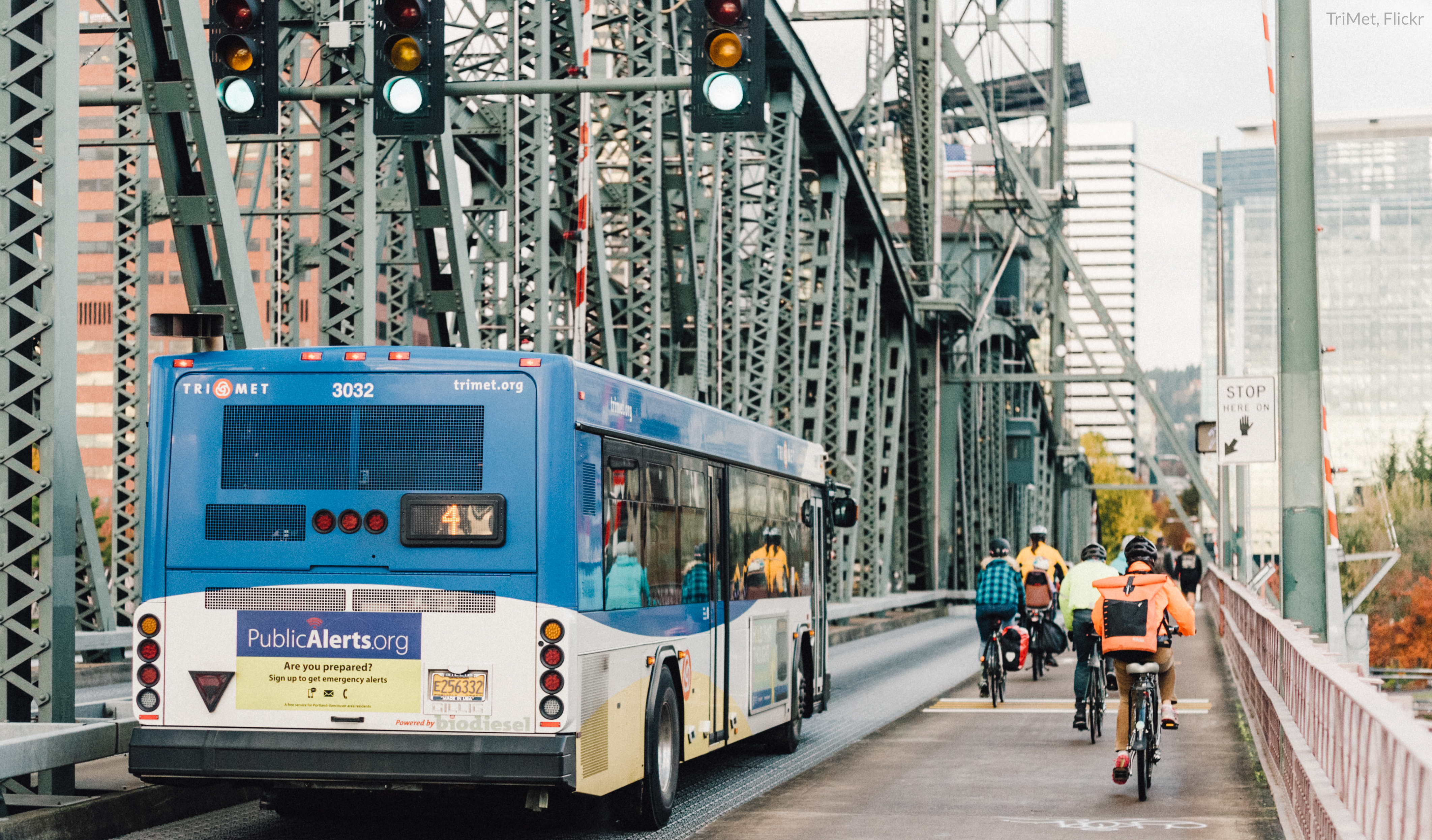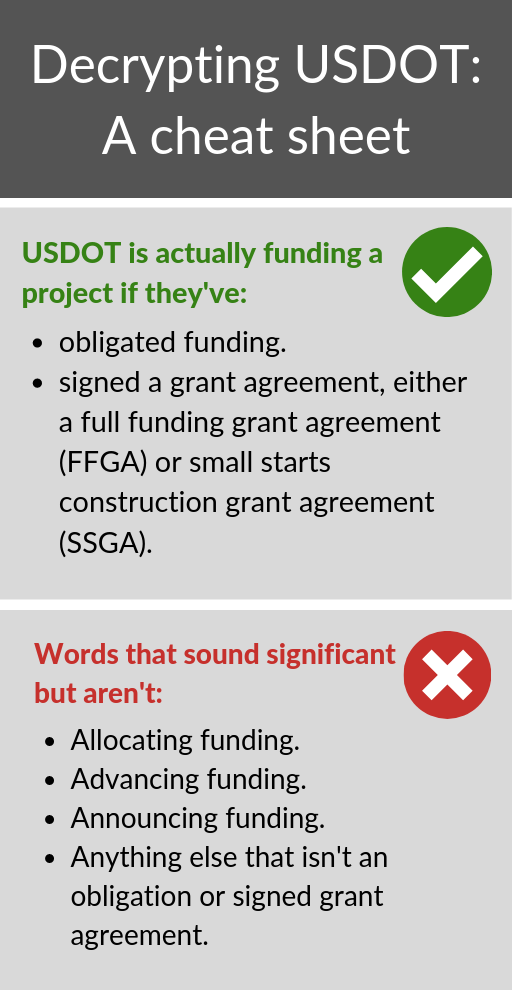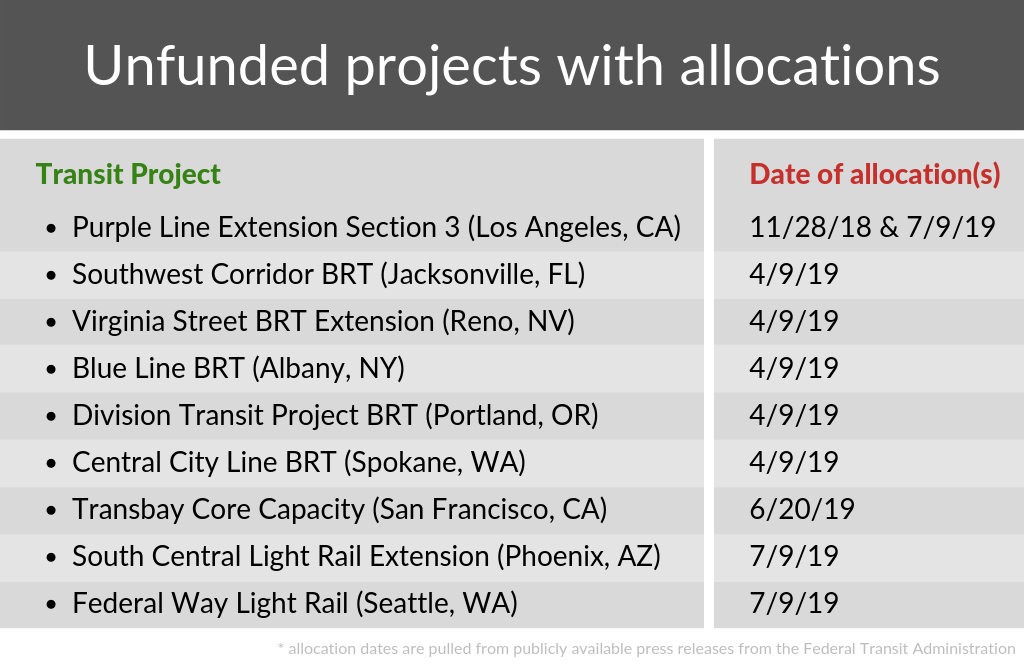
News
By Sean Doyle, September 25, 2019

The U.S. Department of Transportation (USDOT) claims that it isn't intentionally slowing down and undermining transit funding. But nine communities have been waiting months for federal funding on shovel-ready transit projects that have been "allocated" money by USDOT without actually receiving a single dollar. For one of those communities, it has been 10 months since USDOT "allocated" money—an unprecedented and unnecessary delay. How long are communities supposed to wait for USDOT to do its job and fund these transit projects?
USDOT—and the Federal Transit Administration (FTA) within USDOT—has been undermining federal transit funding since the Trump administration took office as we've chronicled for more than a year now.
They have inexplicably delayed grants, become less responsive, helpful, or timely in shepherding projects through the application process, and radically scaled back the scope of information it releases to the public in a transparent fashion. But their latest strategy appears to be a simple refusal to award grants.
Earlier this summer, the U.S. House held an oversight hearing—spurred in part by our efforts to focus public attention on this issue—into USDOT's mismanagement of the transit Capital Investment Grant program, the primary source of federal funding for expanding or building new transit.
During the hearing, Acting FTA Administrator K. Jane Williams was asked about why the agency has been internally allocating money to various transit projects but then failing to subsequently award those grants. She responded, "in our administration, when we make an allocation, it is our signal that we will sign a grant agreement."
Except the agency's own actions make that look, at best, like a grossly deceptive statement.
Decrypting DOT
To understand this issue it's important to understand a little context which makes clear just how unprecedented the Trump administration's action (or lack thereof) has been in this instance.
 Under previous administrations, both Democratic and Republican alike, each year USDOT would publish a list of transit projects it anticipated awarding funding to in the following year and then in the annual budget process, Congress would give the agency the requisite amount needed to advance those projects. As grant applications were tweaked and finalized, USDOT would allocate funding to particular projects before a final grant agreement was signed—which usually happened soon afterward. An allocation, while technically an internal accounting tool, was a pretty reliable signal that the official grant was coming soon.
Under previous administrations, both Democratic and Republican alike, each year USDOT would publish a list of transit projects it anticipated awarding funding to in the following year and then in the annual budget process, Congress would give the agency the requisite amount needed to advance those projects. As grant applications were tweaked and finalized, USDOT would allocate funding to particular projects before a final grant agreement was signed—which usually happened soon afterward. An allocation, while technically an internal accounting tool, was a pretty reliable signal that the official grant was coming soon.
Under the current administration, those old norms no longer hold. USDOT has stopped publishing a list of projects it anticipates funding in the next year because they’re ideologically opposed to funding any transit projects. But Congress has continued to fund the program with bipartisan support every year. Now, when USDOT "allocates" funding to projects, they put out a press release and newspapers mistakenly announce that USDOT has funded the local transit project. Yet no money has changed hands and no grant agreement has been signed. Getting an "allocation" today just means USDOT moved numbers around on an internal spreadsheet, nothing more.
When Williams said an allocation is "our signal that we will sign a grant agreement," the implication was that a grant agreement would follow soon. But one project—the Purple Line extension in Los Angeles—has been waiting for 10 months since they were allocated funding. In Los Angeles's case, USDOT has made two separate allocations totalling $200 million but there is still no grant agreement on the books. A streetcar in Tempe was also allocated funding 10 months ago (at the same time as Los Angeles) and only just received a grant agreement today. Eight other transit projects have similarly received allocations months ago with no subsequent grant agreement. USDOT has given no justification for these months-long delays and seems content to simply deny that they're happening at all.

Transit gets stuck in limbo
Thirty-two transit projects in 23 communities are currently awaiting grant agreements from FTA to get their transit projects off the ground. Bus rapid transit lines, streetcars, subways, and commuter rail projects are all "Stuck in the Station" and USDOT is sitting on more than $2.3 billion in funding that Congress has allocated to fund transit projects since 2017.
That is a lot of money that could help improve mobility in El Paso, TX, Tempe, AZ, Milwaukee, WI, Pittsburgh, PA, or any of the other places waiting for funding. It also pales in comparison to the $40 billion that USDOT doles out to states each year that is overwhelmingly used to build new highways and other roads, with no confusing, unclear, long wait for the money to arrive.
The Trump administration's hostility to transit is well documented, but USDOT's willingness to play fast and loose with public funds while local communities deal with the delays, inflated costs, and uncertainty that the agency's antics create is really quite astounding. Until the administrators at USDOT get their act together or Congress finds a way to compel them to do their job, we'll keep the spotlight on them.
Related News

© 2026 Smart Growth America. All rights reserved
Site By3Lane Marketing









